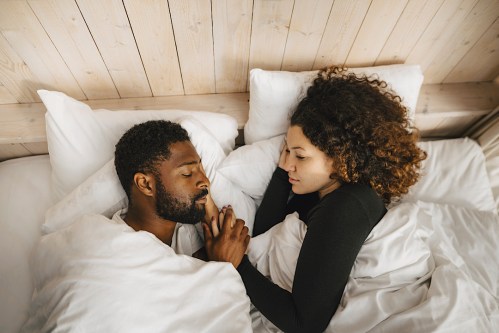When I met my now husband, Marc, I didn’t believe in love at first sight or marriage, so it wasn’t entirely surprising when I didn’t feel fireworks or butterflies on our first date. Still, because I wasn’t immediately sure he was the one like so many of my closest friends said they knew about their spouses—and assured me I would too when I met my person—I began to have doubts.
By the time I met Marc, I was 24, been through many breakups, and was grappling with my parents’ separation. At that point, I’d also been in therapy for years, unsuccessfully trying to sort out my relationship fears and deep-rooted abandonment issues, so I chalked up my lack of clarity to a combination of the two.
As our relationship progressed, however, the doubts didn’t go away. I was constantly plagued with panicky, intrusive thoughts like: “What if I don’t really love him?” “What if I’m not attracted to him?” “What if he’s wrong for me?” “How do I know he’s the one?” “What if I’m not straight?” Nothing was wrong with our relationship—so why did I feel a sense of impending doom?
It wasn’t until I randomly came across a podcast episode by marriage and family therapist Sheva Rajaee, MFT, founder and director of The Center for Anxiety and OCD, that I started to understand that my doubts about Marc may be deeper than cold feet. She introduced me to a term I’d never heard of before, relationship OCD (ROCD), despite having been diagnosed with obsessive compulsive disorder when I was 9 years old.
What is relationship OCD?
“ROCD centers on the ‘rightness’ of one’s relationships,” Rajaee, who is also a counselor for the International OCD Foundation, tells me. Generally, this theme focuses on romantic relationships but can also apply to relationships with friends, family members, and even pets. “It’s caused by hyperactivity in a region of the brain called the amygdala, which is the fear center of the brain, and it can be exasperated by childhood attachment traumas, such as a caregiver who was inconsistent, absent, or overly controlling. It can also be heightened in relationships where the ‘threat’ of vulnerability exists, for example when dating a potential lifetime match rather than a fling.” In all likelihood, it could’ve been the depth of feelings I had for Marc that triggered my OCD symptoms, and the reason why I’d never experienced the same type of issues in past relationships. For the first time since experiencing these thoughts about my relationship, I felt hopeful.
It couldn’t have come too soon because By this point, Marc and I were engaged, and I was having dreams every night of myself looking down the wedding aisle and running away. I even took to Instagram to share my fears, and a few people who were experiencing ROCD messaged me. A common refrain was this one from a woman named Sara:
“It made me question every action I made,” she writes.
According to Rajaee, these intrusive thoughts are all too common for people with ROCD or relationship anxiety—which are basically the same illness but fall on different parts of a spectrum based on their intensity. “While most people who hear your doubts will say, ‘maybe you’re just not that into your partner,’ Rajaee explains that those with RA or ROCD are usually in good, healthy relationships and need to change their relationship to anxiety, not change their partner.
Treatment options for ROCD
If you are experiencing paralyzing or incessant relationship-related concerns and thoughts, you should speak to a mental health professional. Rajaee explains that people tend to have good results addressing ROCD and RA with a combination of cognitive behavioral therapy (CBT), acceptance and commitment therapy (ACT), and exposure therapy (ERP). “In my experience, exploring childhood traumas related to a fear of intimacy and vulnerability is also an important element to treatment,” she suggests.
Ultimately, I increased my OCD medication and enrolled in a three-month workshop with a cognitive behavioral therapist. The coping mechanisms I learned proved to be very helpful. One of my favorite exercises examined the evidence for and against my core beliefs. For example, I wrote down proof of why I didn’t actually love Marc and proof of why I did. There was never any evidence to indicate that I didn’t love him.
For Sarah, a treatment called exposure and response prevention (ERP), in which you expose yourself to your biggest fear and give into that anxiety instead of fighting it—helped her the most. “For example, I would look at an ugly picture of my husband 10 times a day and tell myself ‘You’re marrying the wrong person,’ and instead of Googling things or compulsively reminding myself that I love him, I would say ‘Thank you brain for trying to protect me. You’re right, I’m marrying the wrong person. Oh well.’” She leaned into the anxiety until it became too hilarious to be true.
Even though cognitive-behavioral and ERP therapy helped me tremendously, I still face relationship anxiety sometimes. But it’s far less severe and common, and I’m much better at managing it. So much so that I woke up on my wedding day more calm and clear than I had in months. Each day I get closer to my husband and closer to a place where my relationship trauma and anxiety don’t affect our marriage.
Oh hi! You look like someone who loves free workouts, discounts for cutting-edge wellness brands, and exclusive Well+Good content. Sign up for Well+, our online community of wellness insiders, and unlock your rewards instantly.
Sign Up for Our Daily Newsletter
Get all the latest in wellness, trends, food, fitness, beauty, and more delivered right to your inbox.
Got it, you've been added to our email list.











